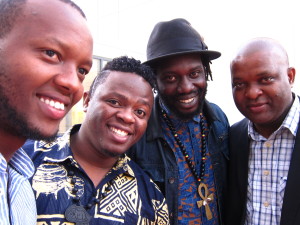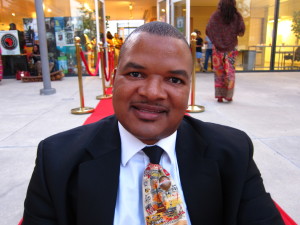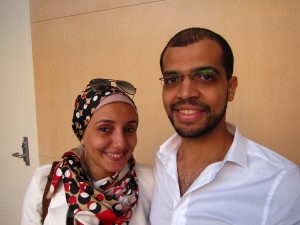By Sharon Simonson
MOUNTAIN VIEW, Calif. — Late afternoon autumn squalls lift the long red carpet in front of Mountain View’s Community School of Music and Arts, creating fun havoc in the opening moments of the Silicon Valley African Film Festival.

Organizers rush to find heavy — but aesthetically pleasing! — objects to weight the sides. The rug rises again before they succeed. Everyone laughs and scrambles to pull it back into place.
Really, it seems nothing can suppress the joy that the gathering exudes, the uplift from another perfect Northern California evening—soft light, warm sun, cool air—and the young African and African-diaspora filmmakers arriving from points near (Oakland) and far (Egypt, Tanzania, Sierra Leone, Rwanda).
Bonginhlanhla Ncube has traveled from South Africa. His 92-minute comedy, “Safe Bet,” chronicles the travails of two dunces who borrow a boss’s money to wager on a fixed boxing match. In July, the movie won a Bronze Medal in the Best Action Sequence category from the Global Independent Film Awards.![]()
Ncube is delighted with the African Film Festival’s recognition. He speaks of “inspiration in the Silicon Valley oxygen.” The valley feels to him like Pretoria, his home: calm. He prefers that to Johannesburg’s hustle: “It allows you to think,” he says. He wonders if serenity undergirds the great thoughts that have led to Silicon Valley’s abundance of business creation.

“Rumor has it that a lot of big things start in Silicon Valley,” he jokes. “I am hopeful by the time I go back home, I have a $1 million idea.” He plans his return only days hence, an arduous and expensive trip for the short stay. But, he says, “It means everything to me.”
Chike Nwoffiah, the festival executive director and co-founder, weaves through the crowd, greeting guests, men and women and a few children, many in African dress. Some nibble on hors d’oevres at small, round, bar-height tables in the school’s lobby. Organizers have arranged another red carpet in front of a large white canvas that hangs from ceiling to floor and is decorated with the multicolored brand names of the festival sponsors: Brocade, NetApp, Starbucks, Hotel Avante, Costco. Men in tuxedos and ladies wearing high heels take selfies in front of it.
A Nigerian by birth who has lived in Silicon Valley for nearly three decades, the 50-year-old Nwoffiah wears a blue and white patterned knee-length tunic over dark slacks and dress shoes. He has the happy demeanor of a man with a deep faith in the goodness of the universe or who has completed a difficult task many times and is confident he will do so again. Over the next two days, he expects to show 43 short- and feature-length narrative fiction, documentary and animation films across two screens. It will be the sixth festival and the largest in terms of submission count: 230. Nwoffiah conceived the festival as a platform for African and Africa-diaspora artists to take control of their continent’s and its 54 countries’ images, to change their profiles in the global public imagination.![]()
“America is one of the greatest countries in the world partly because of what Hollywood puts out about it,” observes filmmaker Fofo Gavua, a 27-year-old from Toronto of Ghanaian descent, as he socializes in the lobby after walking the red carpet. His 15-minute narrative short “Sophie” was filmed in Ghana over seven months in early 2014. It explores the relationship and lives of a prostitute and a priest, the nature of morality and hypocrisy.

He filmed it for $2,500 using a Panasonic GM1 camera with a 1970s Nikon lens, which he already owned, Gavua says. The small, mobile camera and accessible Ghanaian streets (no government permits required) opened “guerrilla filming” opportunities to keep costs low. Power supplies were sketchy: “We have lots of one-take and two-take scenes,” he says. It is his first film.
Gavua lived in the West African country for 13 years beginning at age 4. He also attended university there. He doesn’t expect the western media or Hollywood to change their current Africa narratives, illustrated by “Hotel Rwanda,” “Blood Diamonds,” and “The Last King of Scotland.”
“So I’ve taken it upon myself to show a different Africa,” he says. “I hope to tell African stories that are more empowering.”
Moments later, in the school’s Tateuchi Hall, Mountain View Mayor John McAlister, dressed in a coat and tie, mounts the stage before the screening of “Eye of the Storm.” The two-hour feature film officially starts the festival. He acknowledges that no one wants to hear a mayor read a proclamation. The audience laughs. But the proclamation is important, he tells them, and he reads it anyway.
“We are proud to have you and the film festival here,” he says in earnest preamble. “It’s a showcase of authentic voices. Thank you for enriching our cultural landscape.”
Sanelle Sibanda, a filmmaker living in Oakland and a native of Zimbabwe, presents his third feature-length film, which he also co-wrote, “Zola The Bicycle Thief,” on the last day of the festival. It was filmed primarily in Zimbabwe but partially in the Bay Area for $150,000.
When he first went to Zimbabwe with the idea to make the film, no one believed him, he said. But after awhile, people came around. In the end, of the 1,000 actors he employed, 990 of them are from Zimbabwe. He hopes appearing at festivals like Silicon Valley’s leads to the film’s wider distribution. “So much talent in Africa goes undiscovered,” the 43-year-old says. “I wanted to give people hope that they can see themselves on a stage or in a film.”